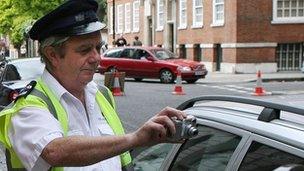Parking charges: Money-grabbing or investment boost?
- Published
The half-billion-pound parking cash cow reportedly enjoyed by some English councils has generated headlines, yet alongside hundreds of authorities that boosted their income another 52 apparently ran their parking services at a loss.
Are these councils being more sympathetic to motorists, or missing the opportunity to offer improved services to businesses and residents?
According to the RAC Foundation report, external, English councils had a total surplus of £565m from parking operations in 2011-12, up £54m on the previous year.
Professor Stephen Glaister, director of the RAC Foundation, describes the revenue from parking charges as "a nice little earner" for councils.
Topping the list of authorities is Westminster, where officials, as well as disputing some of the figures behind its reported £41.6m surplus, say the revenue helps pay for a range of vital transport and highways services that help the High Street prosper.
Bottom of the table are Essex County Council, which lost £1.8m, and Surrey County Council which lost £1.3m.
Councillor Rodney Bass, Essex cabinet member for highways and transportation, said: "The boroughs and districts have their own off-street car parking, but we don't have a tradition of on-street parking charges and it works very well.
"It is called 'localism'. We decide what happens here and [Westminster] decides there.
"We run a park-and-ride system, Essex has one of the best here in Chelmsford.
"Our car parks are still off-street. I don't think there is a single parking meter in Essex - we are a parking meter-free county and we are proud of it."
Investment
Similar park-and-ride schemes run by other authorities are often paid for by money brought in through parking charges.
Guildford Borough Council, which generates more money from its parking than all the other Surrey boroughs and districts combined, is set to launch its fourth park-and-ride service in the town.
"In Guildford we make around a million a year in surplus and use that to subsidise the park-and-ride scheme into town, a scheme that has proven popular with traders and residents alike," says Councillor David Goodwin, who sits as an opposition member on both Surrey County and Guildford Borough Councils.
He was also a member of Surrey's parking task group.
"The park-and-ride is there to alleviate parking and traffic problems in the town. If you just look at the park-and-ride they wouldn't be able to operate at the level they do without the parking income," he says.
"For the traders in town and the workers in town, park-and-ride helps them. It keeps traffic out of the town centre which is a massive benefit to the residents who live there.
"As an opposition member I would love to say it's 'money-grabbing' but I just can't, and I don't get that at all from residents."
Misconception
As well as accusations of "money-grabbing', authorities are accused of using parking charges and fines as "stealth taxes", but officials at the biggest earner highlight the use of funds for area improvements.

Westminster City Council says it makes no money from parking fines
Westminster service development manager Kieran Fitsall says: "The actual surplus was £36.3m last year and the money generated goes on transport and infrastructure, this includes bridge repairs and all sorts of schemes from the Freedom Pass and concessionary fares for the elderly and disabled.
"It all goes back into transport."
He adds: "One misconception is that Westminster generates money from issuing parking tickets. We don't actually generate money from issuing parking tickets, it practically costs us the same to operate that as we take in."
A Controlled Parking Zone permit in Westminster costs £130, while daily and hourly charges vary depending on where you park from £1.20 per hour to £4.40.
"Charges for the permits were set some years back and are reviewed every two years, normally it is just an inflationary increase," says Mr Fitsall.
"Money that is generated is from people paying to park legally. Last year we took in £38.3m from people paying legally to park.
"That has been increasing as more people have been parking legally. The number of tickets being given out has gone down and there have been no cutbacks of enforcement officers.
"These charges are important as it benefits everyone in terms of those who live and work in Westminster."
The growth in pay-by-phone parking has seen revenues rise and tickets issued fall, while the council also has a smartphone app in the works that will let people know the location of available spaces.
The app, called "park right", tells users in real time which parking spots are free and which are taken.
The council is currently at the procurement stage so will not confirm the cost of the project, which will involve installing small sensors in the road to relay information to the app displaying free spaces as green dots and occupied ones in red.
"We are looking at anything we can do to cut down on congestion and make it easier to get around," says Mr Mr Fitsall. "It is better for the High Street as people spend less time looking for parking and more time in the shops."
The full list of councils operating parking services at a loss are: Ashfield, Babergh, Barnet, Basildon, Blaby, Breckland, Brentwood, Broadland, Broxtowe, Corby, Crawley, Cumbria, Daventry, East Cambridgeshire ,East Northamptonshire, Essex, Fenland, Forest of Dean, Gedling, Halton UA, Hertsmere, Hyndburn, Lancashire, Leicestershire, Norfolk, North East Derbyshire, North Warwickshire, Northamptonshire, Norwich, Oadby & Wigston, Pendle, Redditch, Rossendale, Sandwell, South Cambridgeshire, South Derbyshire, South Gloucestershire UA, South Norfolk, South Northamptonshire, South Ribble, South Staffordshire, Sunderland, Surrey, Surrey Heath, Tandridge, Telford and the Wrekin UA, Three Rivers, Walsall, Warrington UA, Wealden, Wellingborough, West Lindsey, West Oxfordshire.
- Published1 August 2013
- Published31 July 2013
- Published29 July 2013